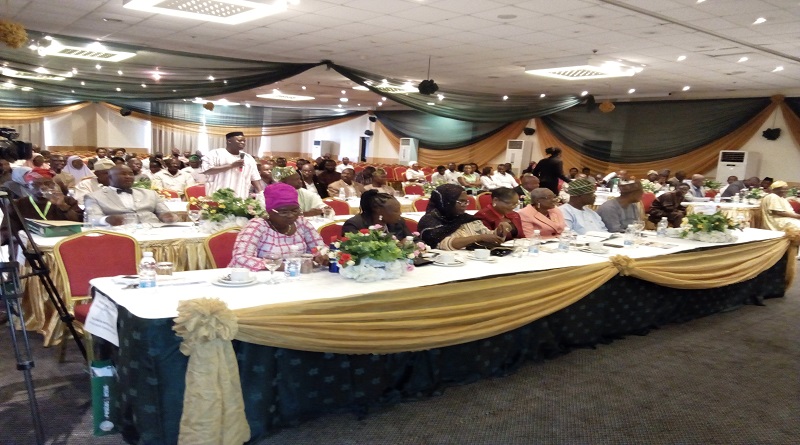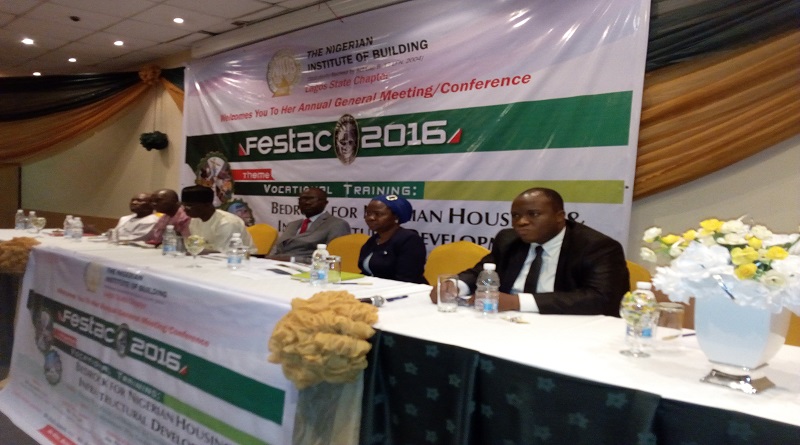Vocational training vital to resolving housing, infrastructural deficit- Builders
Builders under the aegis of Nigerian Institute of Building (NIOB) have said that Vocational Training for artisans and craftsmen in the construction sector is vital to resolving the housing and infrastructural deficit in Nigeria.
Specifically, they posited that attempting to meet the housing shortfall over 20 years at the rate of one million housing units a year, not less than 5-10 million skilled workers made of the key trades- masonry, carpentry, steel fabrication, plumbing, electrical, tiling and painting among others- will be needed.
Gathered in Lagos last week for the 2016 Builders’ Conference and Annual General Meeting, organised by the Lagos State Chapter of NIOB with the theme “Vocational Training: Bedrock for Nigerian Housing and Infrastructural Developmentâ€, they bemoaned the shortfall in skilled labour that is confronting the sector presently.
Main speaker and Project Director, C-STEmp Construction Skills Training and Empowerment project, Anthony Okwa, a builder, stressed that in order to salvage Nigeria from its decaying infrastructure and huge housing deficit, it is imperative that all relevant stakeholders including the Federal, and other arms of government, construction companies, real estate developers, professional bodies and trade associations, must invest more resources in vocational training to boost the number, competence and quality of manpower for the construction sector.
Okwa stressed that quality and quantity of artisans and craftsmen are critical to any nation’s infrastructural development and housing delivery.
He went further, “It is however acknowledged that there is lack of interest in technical education which is one of the major bottlenecks in the nation’s quest to produce artisans in the country. The immediate effect of dearth of artisans in the country is noticed in the high cost of construction in Nigeria now losing huge sums of money to artisans and craftsmen from neighbouring countries.
“Despite the high rate of unemployment in Nigeria, our indigenous artisans have not taken the bull by the horns to hone their skills for employabilityâ€, he added.
The C-STEmp chief called on the Federal, state governments and relevant stakeholders to embark as a matter of urgency on the training of artisans to provide the man power needed in the sector to facilitate housing delivery and infrastructural development.

On the role of professional builder, Okwa said Section 13:12:4 of The National Building Code (2006) charges builders with the responsibility for supervision of Artisans and Craftsmen on site. “This implies that they should determine the performance standards, skills sets and competences required to undertake the job to required standards.
“Thus, from the determination of the occupational standards, prescribing and ensuring provision of training, assessment and certification up to the level of regulation, as far as these pertain to building construction, the professional builder has significant roles to playâ€, he said.
President of NIOB, Tijjani Shuaib, said the conference is timely considering the present agenda of the Federal Government towards job creation among Nigerian youths. He added that skill acquisition in the construction sector and vocational training is a criteria for self-development amongst professionals in the built environment.
Shuaib, who was represented by the second Vice-President of NIOB, Kunle Awobodu, disclosed that the Institute has been given an awarding body status by National Board for Technical Education, Kaduna State for the certification of artisans in Nigeria.
According to him, an assessment and Certification Board has also been inaugurated by the Institute with her experienced and senior members. “The Institute also registers artisans and craftsmen in all the trades in the building industryâ€.
Chairman, Lagos State chapter of NIOB, Mrs. Adenike Said’, explained that the challenge of severe shortage of skilled manpower in the construction industry especially artisans and taking the Lands and Ministry of Housing and Urban Development roadmap, the NIOB has developed structures for training, assessment and certification of artisans and craftsmen as well as professional builders.
Said’ implored her colleagues that work as consultants, civil servants, academics, material manufacturers, contractors among others to continue to exhibit excellent professionalism as well as integrity as any act of misconduct, negligence or unprofessionalism by anyone would always affect many others but there cannot be genuine national economic development without builders.
The two-day conference included syndicate groupings where discussions were centred on skills gap in construction practice; innovative construction materials with modern technology; public-private partnership in skill acquisition in construction sector and the structure and impact of vocational training institutions in other developed countries- lesson for Nigeria.
By Kayode Aboyeji




